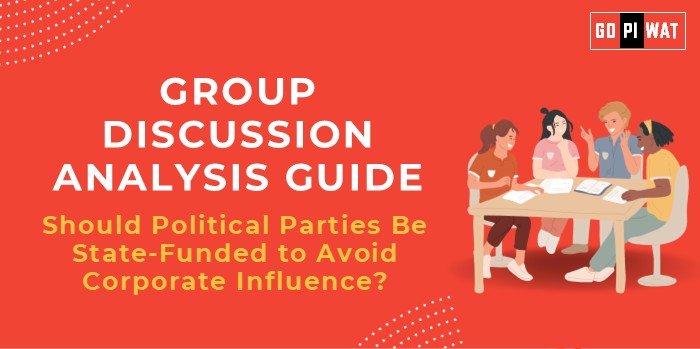📋 Group Discussion (GD) Analysis Guide
🌐 Topic: Should Political Parties Be State-Funded to Avoid Corporate Influence?
🌟 Introduction
- Context: Political funding is a cornerstone of democracy, impacting transparency, integrity, and equity in elections. State funding has emerged globally as a means to address issues of undue corporate influence, with countries like Germany and Sweden setting benchmarks.
- Background: In India, private funding constitutes a major part of political finance, raising concerns about policy biases and unequal competition.
📊 Quick Facts & Key Statistics
- 💰 Corporate Donations to Indian Parties (2022–23): Corporate donations amounted to ₹680.495 crore, with BJP receiving ₹610.491 crore (90% of total contributions).
- 🏛️ Election Costs: The 2019 general elections cost ₹60,000 crore, reflecting the financial intensity of India’s democracy.
- 🌍 Countries with State Funding: 70% of 180 countries provide public funding for political parties to promote fairness and reduce corporate influence.
- 📉 Global Corruption Index (2023): India ranked 85th out of 180, highlighting the need for funding reforms to strengthen democratic integrity.
🧑🤝🧑 Stakeholders and Their Roles
- 🏛️ Government: Create and enforce funding policies.
- 📢 Political Parties: Implement transparency in receiving and using funds.
- 👥 Citizens and Media: Monitor party finances and demand accountability.
- 🌏 Civil Societies and International Bodies: Advocate reforms and assess global best practices.
🏆 Achievements and Challenges
🎉 Achievements:
- 📖 Transparency Promotion: In countries like Germany, state funding limits private influence and enhances public trust.
- 📊 Level Playing Field: Smaller parties in Sweden benefit significantly from public funds.
- ⚡ Reduced Corruption Risks: Denmark’s model ensures minimal external influence.
⚠️ Challenges:
- 🔍 Implementation in India: Allocating funds equitably amidst India’s political diversity is a challenge.
- 📉 Taxpayer Resistance: Citizens may object to public funds being directed towards political campaigns.
- 🌎 Global Comparison: The US relies on private funding, citing freedom of speech as a reason against state-funded campaigns.
🗣️ Effective Discussion Approaches
📌 Opening Techniques:
- 💬 “In 2023, corporate donations to Indian parties totaled ₹680.495 crore, reflecting potential risks of policy capture.”
- 📖 “With 70% of countries adopting state funding, India faces a critical choice for its democratic integrity.”
🎭 Counter-Argument Handling:
- Recognize concerns about misuse of state funds while emphasizing global successes in equitable funding.
🔍 Strategic Analysis of Strengths & Weaknesses
- ✅ Strengths:
- Transparency.
- Reduced corporate lobbying.
- ❌ Weaknesses:
- Possible fund misuse.
- Implementation complexity.
- 📈 Opportunities:
- Strengthen democracy.
- Support smaller parties.
- ⚠️ Threats:
- Taxpayer resistance.
- Entrenched political interests.
📖 Structured Arguments for Discussion
- ✅ Supporting Stance: “State funding prevents undue corporate influence, fostering a fair democratic process.”
- ❌ Opposing Stance: “Public funds should not be diverted to political campaigns; private funding reforms are better.”
- ⚖️ Balanced Perspective: “A hybrid model can balance private contributions with public oversight.”
🎓 Connecting with B-School Applications
- 📘 Real-World Applications:
- Analyze governance models in coursework on public policy or political systems.
- 📋 Sample Questions:
- “Can India replicate Germany’s state-funded system for political campaigns?”
- “What measures can ensure accountability in state funding?”
- 💡 Insights:
- Highlight ethical and strategic implications in interviews or projects.


